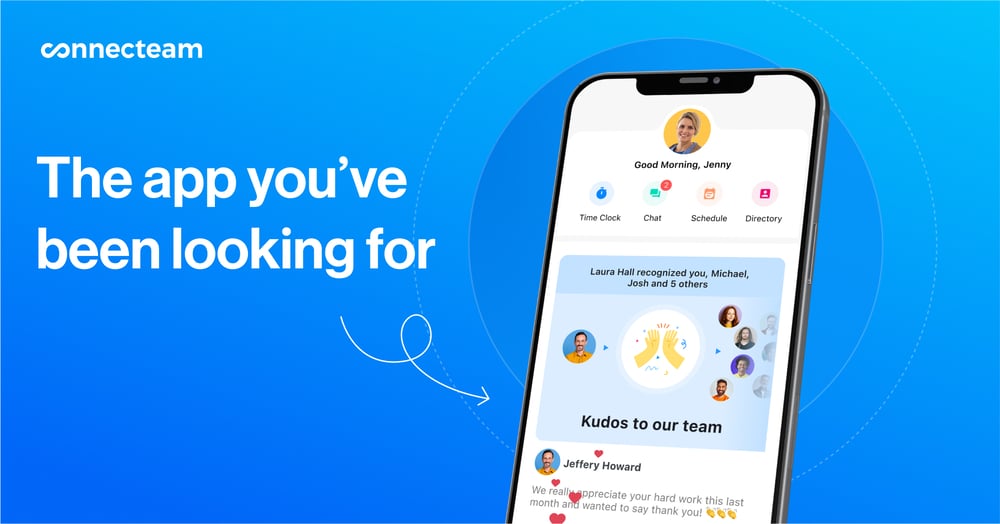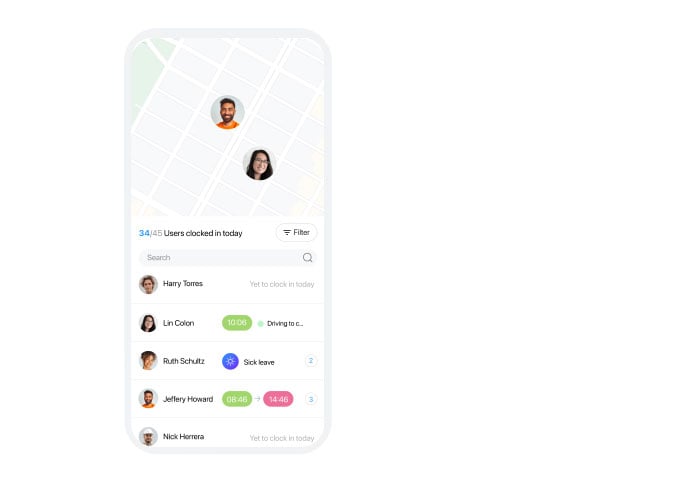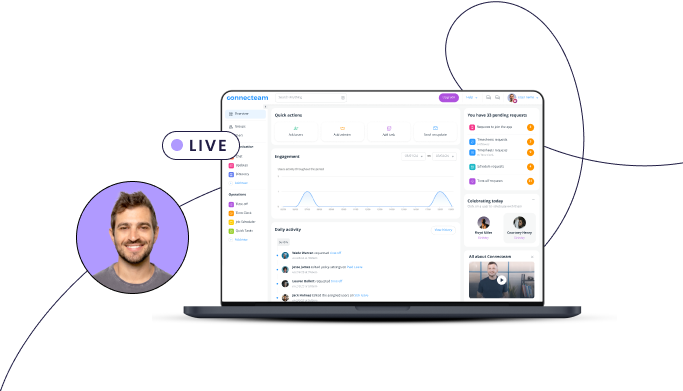What are the key qualities of a good employee? Really think about it. When you’re interviewing candidates to join your team, it’s crucial to look at not only their skills but also what kind of person they are. Recognizing these employee qualities in interviewees or even in your current employees can truly benefit your business.
We rounded up 20 key qualities of good employees you should look out for during the interview process.
Why It’s Important to Look for Employee Traits in New Hires
- Cultural fit: Employees who embody traits that align with your company’s culture and values are more likely to be engaged and satisfied in their roles, which can potentially reduce turnover rates.
- Performance and productivity: Employee traits such as reliability, professionalism, and a strong work ethic directly contribute to higher performance levels and workplace productivity. Employees with these traits are more likely to meet, if not exceed, their job expectations.
- Team dynamics: Soft skills like effective communication, teamwork, and adaptability are vital for healthy team dynamics. Employees who can work well with others, adapt to change, and communicate effectively help create a collaborative work environment.
- Leadership potential: Identifying traits that indicate leadership potential is important for future company growth. Traits like initiative, strategic thinking, and the ability to motivate others are key indicators of potential leaders in your business.
- Innovation and growth: Potential new hires who are creative, open to new ideas, and who come into the interview with a growth mindset are ideal if you want employees to help push the company forward.
When you find someone with the qualities of a good worker and who also matches your company culture, its most likely a good match.

20 Key Qualities Of A Good Employee
They’re a Team Player
Having an employee who can lead a team is one thing; however, when they’re also able to engage with all team members and collaborate well, that’s something else. Companies need team players on their staff to work well with others. It’s one of the most important qualities of a good employee.
They’re a Good Communicator
Sticking with the team player theme, communicating well with others is an integral part of working with a team. This refers to communicating both with team members who are considered equals in their roles as well as managers and company leaders.

They Aren’t Afraid to Speak Up At Meetings
Not only do you want a good communicator, but you also want someone who isn’t afraid to speak up. Simply asking a great question or advocating for a fellow employee’s idea can go a long way to making a lasting impression.
Pro Tip
As a manager, make sure you’re measuring your internal communication strategy to ensure you and your employees are successfully communicating and collaborating.
They Want To Learn
Hire employees who are hungry to learn. During the interview process, look for candidates who ask a lot of questions and already have key information about the company and the industry. This is a great indicator that the person is serious about their job and willing to learn.
Employees who already work for her that also want to learn are great assets to your business, too, because it shows that they are invested in their jobs.
Optimize Team Learning
Create customized training courses for your non-desk teams
They’re Honest
An honest employee is a huge asset because they are able to be open and transparent. This helps create a trustworthy and reliable workplace, which is key for maintaining integrity and ensuring the business runs smoothly.
They’re Adaptable
Hiring people who welcome change is a great practice because they can easily adapt to revolving company policies and processes. It allows you to keep your business innovative and competitive without worrying about employees getting left behind.
They Collaborate With Coworkers
Do the employees you have or want to hire work well with others? How comfortable are they collaborating with a team? No company can succeed with the work of an individual; it’s team collaboration that drives success. You want someone who has a history of collaboration, as well as giving and receiving constructive feedback.
They Have A “Take Charge” Attitude
You don’t want an employee who shrugs their shoulders and thinks there’s nothing that can be done to solve a problem. When someone is faced with a tough challenge, a roadblock, or even low team morale and takes action, they’ll be much more likely to succeed in any job.
They Want Leadership Opportunities
No one gets promoted just sitting around waiting for something to happen. You want an employee who offers to lead a project or be a mentor to new hires. This shows that they are willing to work hard and in the future, they’ll be a good manager.
They Arrive On Time
Being on time to work shows an employee is serious about their job and also shows respect for other people’s time. On top of that, minutes wasted waiting on people in meetings or on job sites can quickly rack up costs for your business.
Pro Tip
Make sure your employees are clocking in and out on time with an employee time clock, like Connecteam. You can manage work hours on jobs and projects, manage timesheets, and streamline your payroll process with automated timesheets and payroll integrations with leading payroll software.
Get started with Connecteam for free today!

They’re Results Driven
Results-driven employees have a strong focus on achieving goals and delivering tangible results, which is great for productivity. Their ability to stay motivated and committed to completing tasks makes them valuable assets to your business.
Employees with a results-oriented mindset tend to take ownership of projects and work until they get the job done.
They’re Detail-Oriented
Businesses benefit from having detail-oriented staff who double-check their work. Detail-oriented employees have an eye for accuracy and catch small mistakes or oversights that others may miss, which helps them achieve better results at work. Their meticulousness helps prevent costly errors and allows projects to be executed correctly.
They Follow Industry Trends
Keeping an eye on what is happening in your industry is a great way to stay ahead of the competition. And when your employees do this, they demonstrate a strong commitment to professional growth and continual learning. Their knowledge of what’s going on in the industry allows them to adapt quickly and perhaps come up with creative solutions.
They Listen To Feedback
Employees who actively listen to feedback from their managers or co-workers exhibit a growth mindset and are willing to improve their skills and performance. Their openness to constructive criticism allows them to improve in their jobs and take actionable steps to learn.
They’re Comfortable With Pressure
Employees who can remain composed and productive under high-pressure are great assets to your business. They’re able to remain focused and make level-headed decisions during stressful times, which helps ensure that important tasks are completed, even in challenging circumstances.
They Ask For Help
It is NOT a sign of weakness to ask for help. It is a strength. No one can get to where they want to be without some help along the way. Asking for help really does show an employee’s greatest strength – after all, it’s better to have someone ask for help than to do something the wrong way.
They’re Optimistic
An optimistic employee can offer new and fresh ideas and new perspectives. Someone with optimism can keep the team focused, even when road bumps present themselves. You want an employee who tackles complications with a positive mindset because they can energize those around them and will help you cross the finish line.
They’re Humble
Sure, chatting about your successes can help motivate the team, but when an employee doesn’t show up and is also able to accept constructive criticism, the company is better for it. Cocky employees are less likely to listen to directions and can negatively impact team morale.
They’re Tech-Savvy
All industries use technology in the workplace, and life can be a lot easier if your employees are able to figure out how to use it without extensive training. For example, if you implement an employee management app, like Connecteam, tech-savvy employees will most likely be able to figure out how to use it quicker than someone who isn’t used to technology.
This Might Interest You
Check out our comprehensive guide to the top employee management tools designed to simplify scheduling, task delegation, and team management.
Check out our guide to the best time and attendance apps, designed to streamline clock-ins, reduce payroll errors, and enhance productivity. Find the ideal solution to keep your workforce on track and your business running smoothly.
They Avoid Gossip
The last thing you want is employees who gossip behind each other’s backs. Not only will the gossip not solve any problems, but it can create a negative team environment.
Pro Tip
If you need to manage difficult employees in the workplace, it’s best to consult them one-on-one and create a correct action plan to adjust their behavior.
Choose the #1 Employee Management App
Engage your team and keep everyone aligned with Connecteam.





